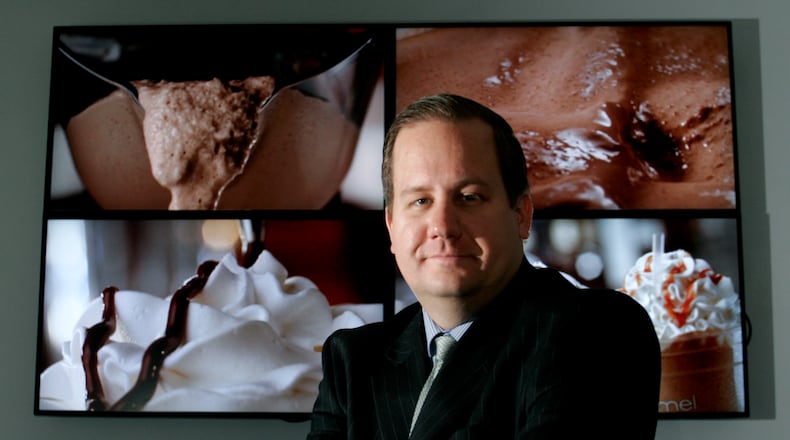And though he says he routinely hears acquisition overtures and invitations to move his Dayton-based company to bigger cities, Riegel, 52, says he has the same answer.
“I have no interest in it,” he said. “This is a mission. We have roots here. We’ll continue to grow and invest here.
“I’m still in the bottom of the third inning,” he added. “I have plenty more game to play.”
Most recently, Riegel’s real estate arm, Arkham, acquired a downtowns building at 33 E. Second St. for $500,000. It’s one of several buildings the company own in downtown Dayton.
Riegel has been a busy downtown investor since 2019, buying the former Kettering Tower at Second and Main streets (now his company’s namesake tower).
He also purchased for $5.5 million the former Premier Health downtown headquarters at 110 N. Main, across from Stratacache Tower, in late 2023. Also that year, Riegel’s company negotiated a leaseholder sale for the KeyBank tower, across Main from the former Kettering Tower.
The latest purchase is for a building with more than 20,000 square feet of office space, with a distinctive shape and reflective panel facade.
What follows is a transcript of a recent interview with Riegel, edited for space and clarity.
Q: What’s your goal behind the purchases of several major downtown buildings?
Riegel: “I’ve been in Dayton really my entire life. We’ve been downtown or just east of downtown for maybe 26 years, give or take. So I’ve got this perspective to say, if you look at the progress that’s happening downtown, the city is on the upswing, relative to development, relative to residential, relative to entertainment options, all of that. ...
“It’s never going to be a straight line (of growth). Things like the pandemic put curves in it, but I remember in (1999) being at Third and Keowee (streets). Our old office was there – with no ballpark, with no East side, effectively. If you have historical context, there has been a tremendous amount of progress in downtown Dayton. And in the end, I think that will continue.
“Now the issues of job losses in the core are a factor. I’m not going to trivialize it, from the (19) ‘70s and the ‘80s. But there’s still an amazing opportunity here. Being steadfast and resolute in being part of the solution is key …”
“It’s time to double down on the future. I put my money where my mouth is.”
Q: When you talk about building a “digital city” in Dayton, what does that vision look like?
Riegel: “Trying to help accelerate the transformation of what used to be a heavy industrial rust belt city with industries that today no longer exist to a great extent, to a modern, creative-class place of innovation. Let’s say, innovation, invention and creation.
“It’s important for Dayton regrow the creative class. If you think about the ’70s with all the headquarters that were here. They’re gone now. The creative class of building next-generation businesses here has got to be core to the mission.”
Q: Is it your hope that by extending your presence in downtown Dayton, you create a center of gravity that draws like-minded entrepreneurs?
Riegel: “That’s definitely part of it … The loyalty to say, let’s grow opportunity here the same way it would be for San Jose, Santa Clara or Boston or Austin, Texas. Why can’t Dayton be at the same tier of learning and innovation and opportunity? You just have to have the vision and resolution … to get it done.”
Q: What’s the role of other players in this vision?
Riegel: “Dayton can’t become a ward of the federal government. We need innovation and commercial sectors. Good things come from the base (Wright-Patterson Air Force Base). Let’s get as many of those as we can. But we shouldn’t be a supplicant to defense tech exclusively. We have to grow native tech in various markets. We have to have 50 different companies to have three or four that are successful.”
Q: Do you see yourself providing seed capital to other companies to help make this happen?
Riegel: “We have Stratacache Capital (a venture capital company). We look at 3(00) to 400 deals a year … We buy companies all around the world. Within that footprint, a lot of these support engineering, accounting, marketing jobs right here in Dayton. We are investing on a global basis to bring jobs to Dayton.”
Question: You’ve said Stratacache hasn’t been a small company for 15 years. But these are still massive investments in downtown Dayton. Can you afford these?
Riegel: “These are not massive investments. Massive investments are in Manhattan or in Miami or in bigger markets. These are not significant spends from our perspective.”
Q: I know you’re privately held and you like it that way. Can you talk about Stratacache’s annual revenue?
Riegel: “Global revenue is in the neighborhood of a billion U.S. dollars, globally, with all the divisions, all the different companies we own.”
Q: What about domestically?
Riegel: “Domestic, I don’t get into specifics, but domestic is a reasonable chunk of that.”
Q: So all of these investments are within your comfort zone?
Riegel: “We’re buying these with cash. So yes, we’re not having to finance them. It’s part of ongoing operations and business. These are minor purchases.”
About the Author

